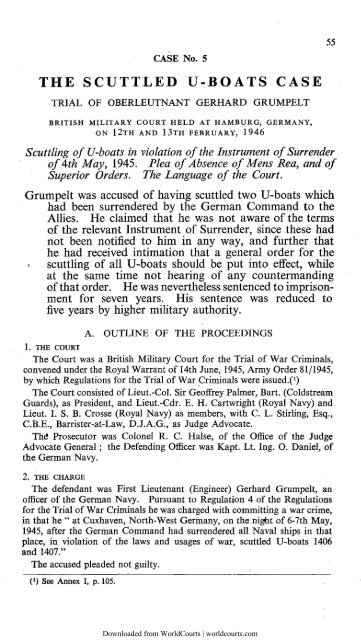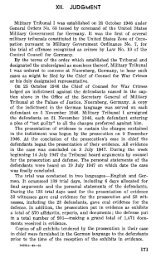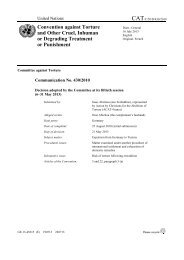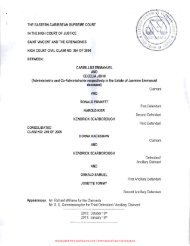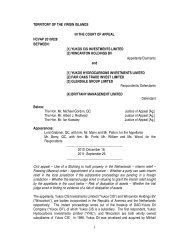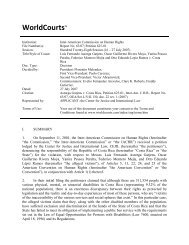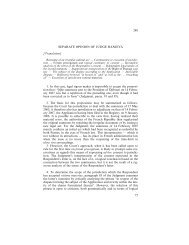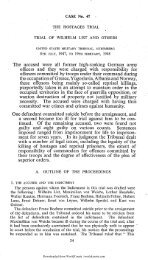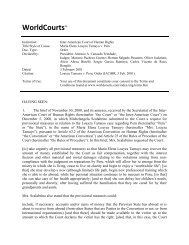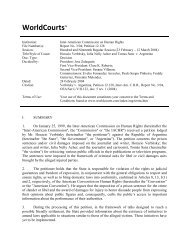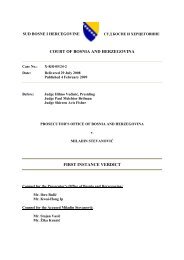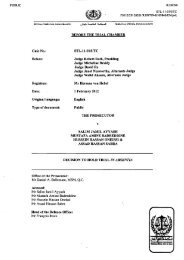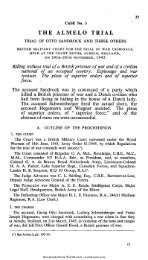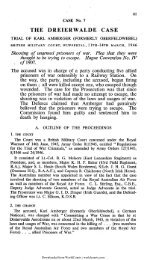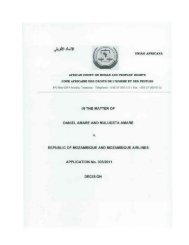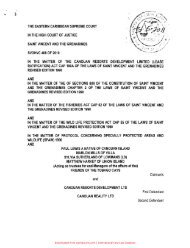The Scuttled U-Boats Case, Trial of Oberleutnant ... - World Courts
The Scuttled U-Boats Case, Trial of Oberleutnant ... - World Courts
The Scuttled U-Boats Case, Trial of Oberleutnant ... - World Courts
You also want an ePaper? Increase the reach of your titles
YUMPU automatically turns print PDFs into web optimized ePapers that Google loves.
56 THE S CUT T LED U-B 0 AT S CAS E<br />
3. THE OPENING OF THE CASE BY THE PROSECUTOR<br />
<strong>The</strong> Prosecutor stated that, before the surrender <strong>of</strong> the German armed<br />
forces to the Allies, the accused was an instructor to U-boat <strong>of</strong>ficers. In<br />
May, 1945, he was at CUxhaven. On the 3rd May, U-boats 1406 and 1407,<br />
which were <strong>of</strong> the very latest type <strong>of</strong> U-boat, arrived at Cuxhaven under the<br />
command <strong>of</strong> their respective captains. <strong>The</strong> war was then nearly at its end.<br />
On the next day, five German <strong>of</strong>ficers '<strong>of</strong> the High Command visited Field<br />
Marshal Montgomery, commanding 21st Army Group, and at 1830 hours<br />
on that day they signed an instrument <strong>of</strong> surrender, whereby the German<br />
High Command agreed to surrender all German armed forces in Holland,<br />
in North West Germany, including the Frisian Islands, Heligoland and all<br />
other islands, in Schleswig-Holstein, and in Denmark, to the Commanderin-Chief<br />
<strong>of</strong> 21st Army Group. This surrender included within its scope all<br />
naval ships in those areas. Hostilities were to cease on land and sea, and<br />
in the air, at 0800 hours British Double Summer Time on Saturday, 5th May,<br />
1945. At the material time, it was agreed by the German High Command<br />
that all German vessels would be handed over to the British Command and<br />
that fighting would cease at 0800 hours on the next day. ,<br />
At 0400 hours on the 5th May, continued the Prosecutor, four hours at<br />
the most before the firing was to cease as a result <strong>of</strong> the terms imposed by<br />
Field Marshal Montgomery, an order was issued by the German Naval<br />
Command giving the code word "Regenbogen"-" Rainbow"-which<br />
meant that all U-boats were to be scuttled. That was some short time after<br />
the German High Command had signed the terms <strong>of</strong> surrender. Later that<br />
morning someone came to the conclusion that that was not quite right and<br />
that order was cancelled. However, Grumpelt must have disagreed, because<br />
he made arrangements, at about 11 o'clock in the morning, that he and the<br />
captains <strong>of</strong> the U-boats 1406 and 1407 would proceed to sea and scuttle these<br />
ships.<br />
That arrangement came to the knowledge <strong>of</strong> a higher German <strong>of</strong>ficer,<br />
and he gave orders that they wer.e not to go to sea. Grumpelt got to hear<br />
<strong>of</strong> this, changed his plan, and made an arrangement by which they would<br />
go to sea at 2200 hours on the night <strong>of</strong> May 6th. That plan was defeated<br />
by the German commander <strong>of</strong> the" Helgoland," who called a conference <strong>of</strong><br />
U-boat commanders at 2000 hours on the 5th May, at which the agreement<br />
was reached that the latter would not scuttle the ships under their command.<br />
Despite this, after a day <strong>of</strong> discussion as to whether the U-boats were to<br />
be scuttled on the next night,. Grumpelt went aboard these two U-boats<br />
with a rating, and scuttled them. He did it, according to his statement, <strong>of</strong><br />
his own volition, quite openly and in a sane mind, because he wished to<br />
deprive the Allies <strong>of</strong> the use <strong>of</strong> those two submarines, which were <strong>of</strong> the very<br />
latest type and capable <strong>of</strong> giving a great deal <strong>of</strong> information to the Allies.<br />
<strong>The</strong> submission <strong>of</strong> the Prosecution to the Court was that it was a war<br />
crime for a member <strong>of</strong> the armed forces, or any member <strong>of</strong> the vanquished<br />
nation, or in fact <strong>of</strong> the victorious nation, to break the terms <strong>of</strong> a surrender or<br />
armistice, especially in the existing circumstances, when a country which<br />
was victorious against one country was still at war with another, an ally <strong>of</strong><br />
the second.<br />
Acting in accordance with Regulation 8 (1) <strong>of</strong> the Royal Warrant, the<br />
Downloaded from <strong>World</strong><strong>Courts</strong> | worldcourts.com
THE S CUT T LED U-B 0 A T S CAS E<br />
Prosecutor put forward a photostatic copy <strong>of</strong> the terms <strong>of</strong> surrender signed<br />
on 4th May, 1945, the relevant paragraphs <strong>of</strong> which read as follows:<br />
" Instrument <strong>of</strong> Surrender <strong>of</strong> all German armed forces in Holland,_<br />
in NorthWest Germany, including all islands, and in Denmark.<br />
" 1. <strong>The</strong> German Command agrees to the surrender <strong>of</strong> all German<br />
armed forces in Holland, in North West Germany including the Frisian<br />
Islands and Heligoland and all other islands, in ScWeswig-Holstein,<br />
and in Denmark, to the C.-in-C. 21 Army Group. This to include all<br />
naval ships in these areas. <strong>The</strong>se forces to lay down their arms and<br />
to surrender unconditionally.<br />
"2. All hostilities on land, on sea, or in the air by German forces in<br />
the above areas to cease at 0800 hrs. British Double SUIllmer Time on<br />
Saturday, 5th May, 1945.<br />
"3. <strong>The</strong> German Command to carry out at once, and withoutargument<br />
or comment, all further orders that will be issued by the Allied Powers<br />
on any subject.<br />
"4. Disobedience <strong>of</strong> orders, or failure to comply with them, will be<br />
- ,: regarded as a breach <strong>of</strong> these surrender terms and will be dealt with<br />
by the Allied Powers in' accordance with the accepted laws and usages<br />
','<strong>of</strong> war."<br />
4:' EVIDENCE FOR THE PROSECUTION<br />
<strong>The</strong> facts as appearing in the evidence for the Prosecution were provided<br />
by four witnesses, <strong>of</strong>ficers and other members <strong>of</strong> the German Navy as<br />
foU()\Vs:<br />
(i) Werner Klug, <strong>Oberleutnant</strong> zur See, commanding U-boat 1406<br />
KIug stated that his ship, which was <strong>of</strong> the latest type, received on the<br />
5th May, 1945, in a message, the code word" Rainbow," which meant<br />
"scuttle." <strong>The</strong> order came between 0300 and 0500 hours, and as a result,<br />
hew-ent immediately to No.5 Security Division for the purpose <strong>of</strong> scuttling<br />
the ship. <strong>The</strong>re an order countermanding the first was given, at about<br />
5 o'clock in the morning, almost immediately after the original order had<br />
been received. Shortly after that, on the same morning, he met the accused<br />
Grumpelt and both <strong>of</strong> them made up their minds to scuttle the U-boats, as<br />
theyconsidered the countermanding <strong>of</strong> the order <strong>of</strong> No.5 Security Division<br />
not binding on them, because they were not under the orders <strong>of</strong> that Division.<br />
<strong>The</strong> meeting for the purpose <strong>of</strong> scuttling the ships was fixed for the afternoon<br />
on the same day.<br />
"Mter that arrangement had been made, KIug received further orders from<br />
the- Chief <strong>of</strong> No.5 Security Division, Captain Thoma, who forbade him and<br />
the other commanders to scuttle their ships, and threatened that they would <br />
be shot in the event <strong>of</strong> disobedience.<br />
<strong>The</strong> witness was unable to state whether he told the accused <strong>of</strong> the order<br />
<strong>of</strong> 'Captain Thoma when he saw him again later, or whether Grumpelt<br />
knew about this order, <strong>The</strong>y both made a new arrangement for 2200 hours<br />
to scuttle the ships nevertheless, because they still considered the order <strong>of</strong><br />
NO'; ,5 Security Division as not binding on them.<br />
Downloaded from <strong>World</strong><strong>Courts</strong> | worldcourts.com<br />
57
58 THE SCUTTLED U-BOATS CASE<br />
<strong>The</strong> latter arrangement was again postponed, because at 2000 hours all<br />
the U-boats commanders were ordered to attend a conference with Admiral<br />
Klaikampf Qn the" Helgoland," where they had to give their word <strong>of</strong> honour<br />
not to scuttle their ships. Grumpelt had not attended the conference,. but<br />
as a result there<strong>of</strong> the meeting between him and Klug at 2200 hours did not<br />
materialise and . they never saw or talked to one another after the conference.<br />
Towards the end <strong>of</strong> 5th May, the witness's ship ceased to be on active<br />
duty, and the crew was paid <strong>of</strong>f, and on the next day the U-boat was towed<br />
to a new position into a corner <strong>of</strong> the port where. all the U-boats were left<br />
. in the custody <strong>of</strong> a guard ship No.. 1267.<br />
Cross-examined by the Defence, the witness stated that there was no<br />
. superior <strong>of</strong>ficer at Cuxhaven whose orders were binding upon him, and that<br />
for operational duties he could not accept orders from the higher <strong>of</strong>ficers<br />
in charge <strong>of</strong> Cuxhaven. <strong>The</strong> No.5 Security Division was an authority <strong>of</strong><br />
the minesweeping department and Admiral Klaikampf was the Commander<br />
<strong>of</strong> the Coastal Defence. For operational duties and orders all U-boats<br />
Commanders were in touch with higher Commanders <strong>of</strong> the operational .<br />
department only by wireless and on a different wave-length from that used<br />
for surface craft. His own listening-in device was not in a state <strong>of</strong> service<br />
at the material time. .<br />
<strong>The</strong> exact contents <strong>of</strong> the capitulation order or the so-called armistice<br />
order, or the wording <strong>of</strong> it, were not notified to the U-boats commanders.<br />
Neither the Prosecution nor the Defence wished to call the commanding<br />
<strong>of</strong>ficer <strong>of</strong> U-boat 1407 because his evidence, it was thought, would b.e practically<br />
the same. .<br />
(ii) Wilhelm Mohr, Obersteuermann, <strong>of</strong>ficer commanding VP1267 at Cuxhaven<br />
This witness said that, on the night <strong>of</strong> the 6/7th May, 1945, he was still<br />
commanding the ship VP 1267, and that at about 2330 hours, the sentry<br />
reported that one <strong>of</strong> the two U-boats which his ship was g!1arding was in the<br />
process <strong>of</strong> being sunk and that men were going on to the other U-boat. He'<br />
did not know their numbers then, but found later on that they were the<br />
1406 and the 1407. He then went on to the boat which was sinking last<br />
and there found O/Lt. Grumpelt and O/Machinist Lorenz. <strong>The</strong> witness<br />
told the accused to get <strong>of</strong>f the U-boat at once, whereupon all three left the<br />
boat and went on to the witness's boat, VP 1267, where the latter told the<br />
accused that his, the witness's boat and another boat, No. 1225, commanded<br />
by Schroeder, had been detailed as guard ships and that the next morning<br />
he was going to report on the incident.<br />
At the time, the witness thought he was going to get into trouble because<br />
Grumpelt had sunk the U-boats which he, the witness, was guarding. He<br />
even told the accused that he expected to have trouble because <strong>of</strong> this, to<br />
which the accused replied that he would hold himself responsible.<br />
(iii) Wilhelm Lorenz, Obermaschinist, subordinate to a/Lt. Grumpelt<br />
<strong>The</strong> witness said that he was living and messing with the accused on board<br />
the ship VP 1267, commanded by Mohr, when on the pight <strong>of</strong> 6/7th May he<br />
was ordered by the accused to go with him on one <strong>of</strong> the U-boats. <strong>The</strong>re he<br />
was told to search the boat for food-stuffs and after a while to take a piece<br />
Downloaded from <strong>World</strong><strong>Courts</strong> | worldcourts.com
THE SCUTTLED U-BOATS CASE 59.<br />
<strong>of</strong> lard on to his own ship. When he rejoined Grumpelt, he found that the<br />
V-boat was already sinking, from which he assumed that Grumpelt scuttled<br />
it. Both <strong>of</strong> them left the craft, and went to the other V-boat. Grumpelt<br />
went alone to the front and aft <strong>of</strong> the boat and the witness had the impression<br />
that valves were being opened. By that time a sentry was firing<br />
in the direction <strong>of</strong> the boat and after a while they were joined by Mohr.<br />
Water was already flowing through and the boat started sinking.<br />
<strong>The</strong> witness did not know when the armistice was signed, but there was'<br />
talk generally that the armistice had been signed, and they knew that military<br />
operations ended on the 5th May. <strong>The</strong>y did not go on duty that day'as it<br />
was obvious there was no further need to train V-boat crews.<br />
(iv) Edgar Pabst, Oberstaabsrichter at the 5th Security Division at Cuxhaven<br />
Pabst said that, in view <strong>of</strong> the information received from Captain Thoma<br />
on the 7th May, he saw the accused and asked him whether it was true that<br />
he had scuttled the V-boats. Grumpelt replied: "I have scuttled the boats,<br />
I take all responsibility and I had orders to do so. 'Rainbow' was the code'<br />
word."<br />
<strong>The</strong> witness himself knew that the armistice with 21 Army Group was<br />
effective as from some time before the 6th May, as it was generally known<br />
that a "cease fire" had been ordered. He believed it was made known<br />
over the wireless, but was not sure. He could not say whether at that time<br />
he had had any knowledge <strong>of</strong> any terms <strong>of</strong> surrender between the armed<br />
forces.<br />
(v) Affidavit <strong>of</strong>Lt. Hunter<br />
At the end <strong>of</strong> the case for the Prosecution, the latter handed in to the<br />
Court under Regulation 8 (i) an affidavit containing a statement made by<br />
, an <strong>of</strong>ficer attached to the staff <strong>of</strong> the British Naval Commander in Chief,<br />
Germany, who interrogated the accused several times, together with two<br />
exhibits referred to in that statement. One <strong>of</strong> these exhibits, a statement<br />
made by the accused before Lt. Hunter, a translation <strong>of</strong> which was read to<br />
the Court, runs as follows :<br />
"Cuxhaven. 29.5.1945. Statement by Engineer Lt. Gerhard Grumpelt.<br />
(Technical V-boat Training Group.) During the nights <strong>of</strong> 5th,<br />
6th, or 7th May, 1945, I went <strong>of</strong> my own volition on board the boats<br />
V 1406 and V 1407 in order to sink them. <strong>The</strong> fore and after air vents<br />
were opened. <strong>The</strong> Kingston valve was opened from the sea and the<br />
filter <strong>of</strong> the mud trap removed. .Besides this, the air vent <strong>of</strong> the midship<br />
main ballast tank was opened in to the boat. I was hindered in my<br />
task by the guard firing. Nevertheless both boats were sunk. I gave<br />
Chief E. R. A. Wilhelm Lorenz the order to accompany me on these<br />
boats. <strong>The</strong> sinking <strong>of</strong> the two boats was carried out by me personally.<br />
Chief E. R. A. Lorenz switched <strong>of</strong>f the current. We then went on<br />
board patrol vessel (K.f.K.) 1267. I confirm the correctness <strong>of</strong> this<br />
statement. (Signed) Gerhard Grumpelt, <strong>Oberleutnant</strong> (Ing)."<br />
5. THE CASE FOR THE DEFENCE<br />
<strong>The</strong> Defending Counsel admitted that the accused had sunk the two<br />
V-boats during the night <strong>of</strong> 6J7th May, 1945, and thus contravened the special<br />
Downloaded from <strong>World</strong><strong>Courts</strong> | worldcourts.com
62 THE SCUTTLED U-BOATS CASE<br />
(iv) E. Bleihauer<br />
<strong>The</strong> witness claimed that he had been in charge <strong>of</strong> the V-boat flotilla at<br />
Wilhelmshaven which belonged to the same district as Cuxhaven. At the<br />
time he supervised all signals in the flotilla. He was on duty on the morning<br />
<strong>of</strong> 5th May when the code word " Rainbow" was sent out directly to all<br />
V-boats west <strong>of</strong> a certain area. It came from the commandant <strong>of</strong> the<br />
V-boat flotilla in Kiel, Admiral Friedeburg.<br />
7. THE CLOSING ADDRESS OF THE DEFENDING COUNSEL<br />
<strong>The</strong> defending Counsel admitted that the scuttling <strong>of</strong> the two V-boats<br />
was without doubt a violation <strong>of</strong> the laws and usages <strong>of</strong> war, but stated that<br />
this clear fact was not quite sufficient to make the accused guilty, because it<br />
had not been proved that the t.erms <strong>of</strong> surrender were known to the accused.<br />
In fact, at the time when the scuttling took place the accused did not know<br />
those stipulations and could not have known them. Counsel pointed out<br />
the fact that it was forbidden to the whole <strong>of</strong> the German people and,<br />
therefore, to the Gerinan Wehrmacht, to listen in to Allied or neutral radio<br />
stations. To these stations belonged also those German stations which<br />
fell into the hands <strong>of</strong> the enemy, for instance Hamburg, which was conquered<br />
during the war. That order, was, <strong>of</strong> course, obeyed, and it was not until<br />
after the general surrender and capitulation on the 8th May, 1945, that the<br />
order was cancelled.<br />
Counsel also submitted that in all German <strong>of</strong>ficial documents and communications<br />
<strong>of</strong> that period only the word or idea <strong>of</strong> " cease fire" was used<br />
and mentioned. As to this, Counsel said that only on the 7th May, 1945,<br />
after the scuttling, did the accused hear anything about the so-called " cease<br />
fire," and that the conditions relating to the German units stationed in<br />
North West Germany, in Holland and in Denmark between the 5th and<br />
8th May, 1945, were always called by the German authorities" cease<br />
fire" and not" armistice," "surrender" or "capitulation." Only after<br />
the 8th May, 1945, the day when the whole German Wehrmacht capitulated,<br />
was the word "armistice" mentioned. As distinct from the expression<br />
"armistice," the words" cease fire," in the Counsel's.submission, meant<br />
only that all acts <strong>of</strong> war with the enemy were interrupted temporarily, and<br />
that after " cease fire" these hostilities might be continued or on the other<br />
hand an armistice might be concluded.<br />
<strong>The</strong> third point <strong>of</strong> the defending Counsel's submission wasthat apart<br />
from the above facts the accused had, by virtue <strong>of</strong> the receiving <strong>of</strong> the code<br />
word" Rainbow," a clear order and duty to scuttle the boats under all<br />
conditions. In all the German armed forces, he said, it had always been a<br />
holy tradition and duty never to allow any arms, not even in the worst<br />
circumstances or conditions, t6 fall into the hands <strong>of</strong> the enemy. This duty<br />
could only be cancelled through the conclusion <strong>of</strong> an armistice. During the<br />
whole duration <strong>of</strong> the war this spirit had be.en taught to all soldiers through<br />
their <strong>of</strong>ficers again and again and it had become part <strong>of</strong> their code <strong>of</strong> honour.<br />
Any soldiers who acted otherwise would have been condemned to death.<br />
In order to make sure that in extreme cases or conditions this Was so understood<br />
an order, the code word" Rainbow," had been prepared. Thiscode<br />
word dealt with scuttling and destruction <strong>of</strong> ships <strong>of</strong> war provided the<br />
Downloaded from <strong>World</strong><strong>Courts</strong> | worldcourts.com
THE SCUTTLED U-BOATS CASE<br />
<strong>The</strong> Prosecution, stated the Judge Advocate, asked the Court to "say<br />
that on the evidence you should find as an irresistible inference that the<br />
accuseq on that night did not bother to make inquiries apparently <strong>of</strong> any<br />
superior <strong>of</strong>ficer and he had quite a tiine on the day in question to do so if<br />
he wanted to, and the only interpretation you can put upon that is that he<br />
was deliberately wishing to appear as a German patriot and sink these craft<br />
in circumstances in which he knew perfectly well he was not entitled to and<br />
knowing perfectly 'well he had no proper orders from a proper lawful<br />
superior authority to carry out."<br />
10. THE VERDICT AND SENTENCE<br />
<strong>The</strong> accused was found guilty <strong>of</strong> the charge.<br />
After the Prosecutor had stated that he himself was satisfied that the<br />
accused had an entirely good character, the defending Counsel pleaded on<br />
his behalf in mitigation <strong>of</strong> punishment. To that end Counsel made a statement<br />
which included the following:<br />
" <strong>The</strong> Prosecutidn tried to establish a case that the accused acted entirely<br />
on his own and out <strong>of</strong> his own decision. As I see it, the expression ' own<br />
decision' has not been understood in the' right way. <strong>The</strong> accused did not<br />
want you to infer that he scuttled the V-boats on his own because he<br />
sought fame or something similar. I want to point out the reason is,<br />
because <strong>of</strong> the absence <strong>of</strong> the V-boat commanders, Grumpelt thought that<br />
the above-mentioned Leader order came into effect."<br />
On 13th February, 1945, subject to confirmation by higher authority, the<br />
Court sentenced the accused to be imprisoned for seven years. <strong>The</strong> findings<br />
and sentence were confirmed by the General Officer Commanding 8 Corps<br />
District on 8th March, 1946, with a remission <strong>of</strong> two years.<br />
B. NOTES ON THE CASE<br />
1. QUESTIONS OF JURISDICTION AND PROCEDURE<br />
(i) Composition and Jurisdiction <strong>of</strong> the Court<br />
As to th.ese, see Annex I, pp. 105-6.<br />
(ii) <strong>The</strong> Language <strong>of</strong> the Court<br />
<strong>The</strong> trial was conducted under the rules <strong>of</strong> procedure specified in the<br />
Royal Warrant.<br />
At the very outset, defending Counsel applied for the whole <strong>of</strong> the proceedings<br />
to be translated to the accused. Counsel stated that he would<br />
himself address the Court and speak during the whole trial in German.<br />
<strong>The</strong> Judge Advocate thereupon explained-the position as follows:<br />
" <strong>The</strong> language <strong>of</strong> the Court is English, and it is quite unusual for the<br />
Court to be addressed in German. What we normally do is to translate<br />
all the evidence so that the accused understands it, but it is quite unusual<br />
to translate everything the defending Counsel says."<br />
After ascertaining that Counsel had some knowledge <strong>of</strong> English, the Judge<br />
Advocate requested that'Counsel should do his best to address the Court in<br />
Downloaded from <strong>World</strong><strong>Courts</strong> | worldcourts.com<br />
D<br />
65
,<br />
68 THE·SCUTTLED U-BOATS CASE<br />
Hague Regulations do not mention the matter. This controversy has been<br />
summarised as follows: <br />
" Everybody agrees that belligerents during an armistice may, outside the<br />
line where the forces face each other, do everything and anything they like<br />
regarding defence and preparation <strong>of</strong> <strong>of</strong>fence; for instance, they may<br />
manufacture and import munitions and guns, drill recruits, bliild fortresses,<br />
concentrate or withdraw troops. But no unanimity exists regarding such<br />
acts as must be left undone, or may be done, within the very line where the<br />
belligerent forces face each other."(6)<br />
It seems therefore that the legal issue is in doubt, but in any case it must<br />
be argued that the above-mentioned controversy and the differentiation put<br />
forward by the Defence Counsel, as well as the meaning which according<br />
to him should have been laid upon the "cease fire" conception, was not<br />
relevant to the case, because it must have been obvious to the accused, as<br />
it must h€\.ve been to the most rudimentary intelligence, that the German<br />
Naval Authorities could not have issued a general order for scuttling all<br />
naval craft if only a simple" cease fire " was agreed upon temporarily, after<br />
which, as the Defence contended, hostilities might have been resumed.<br />
(b) Violation <strong>of</strong> the Terms <strong>of</strong> Surrender viewed as a War Crime. That<br />
capitulations, surrender conventions and armistices must be scrupulously<br />
observed is an old customary rule strengthened by the provisions <strong>of</strong> Article<br />
35 <strong>of</strong> the Hague Regulations which expressly provides that" capitulations<br />
agreed upon between the contracting parties must . . . be scrupulously<br />
observed by both parties."<br />
Itwould therefore appear as beyond doubt that any violation <strong>of</strong> a capitulation<br />
or armistice is prohibited -and if committed constitutes a violation <strong>of</strong><br />
the customary and conventional rules <strong>of</strong> the laws and usages <strong>of</strong> war. <strong>The</strong>re<br />
is no doubt that any act contrary to a capitulation and any violation <strong>of</strong><br />
an armistice would also constitute a war crime if committed by individuals<br />
on their own account. This point <strong>of</strong> view finds confirmation, in addition<br />
to the above-mentioned provision, also in Article 41 <strong>of</strong> the Hague Regulations,<br />
which says that" a violation <strong>of</strong> the terms <strong>of</strong> the armistice by individuals<br />
acting on their own initiative . . . entitles the injured party to demand<br />
the punishment <strong>of</strong> the <strong>of</strong>fenders . . ."<br />
It is also to be recalled that the Royal Warrant <strong>of</strong> 14th June, 1945, by<br />
which Regulations for the trial <strong>of</strong>warcriminalswere issued, expresslyprovides<br />
that" , War Crime' means a violation <strong>of</strong> the laws and usages <strong>of</strong> war ..."<br />
<strong>The</strong> same definition has been provided by the Charter <strong>of</strong> the International<br />
Military Tribunal in Article 6 (b), which reads as follows: "<strong>The</strong><br />
following acts, or any <strong>of</strong> them, are crimes coming within the jurisdiction<br />
<strong>of</strong> the Tribunal for which there shall be individual responsibility: war<br />
crimes: namely, violation <strong>of</strong> the laws or customs <strong>of</strong> war. Such violations<br />
shall include, but not be limited to, murder, illtreatment or deportation to slave<br />
labour, or for any other purpose, <strong>of</strong> civilian population <strong>of</strong> or in occupied<br />
territory, murder or illtreatment <strong>of</strong> prisoners <strong>of</strong> war or persons on the seas,<br />
killing <strong>of</strong> hostages, plunder <strong>of</strong> public or private property, wanton destruction<br />
<strong>of</strong> cities, towns or villages, or devastation not justified by military necessity."<br />
(.) Ibid, p. 438.<br />
Downloaded from <strong>World</strong><strong>Courts</strong> | worldcourts.com
THE S CUT T LED U-B 0 AT seA S E<br />
From the latter part <strong>of</strong> this Article it follows that not only crimes <strong>of</strong> the<br />
" murder type" (atrocities) but also violations <strong>of</strong> any other laws or customs<br />
<strong>of</strong> war should be considered as war crimes, even though such violationsmight<br />
constitute purely technical <strong>of</strong>fences only.<br />
(c) <strong>The</strong> Instrument and Terms <strong>of</strong>Surr.ender. <strong>The</strong> charge against Grumpelt<br />
was based on the Instrument <strong>of</strong> Surrender signed on 4th May, 1945, which,<br />
in paragrapl]. 1, provided that" the German Command agrees to the sur-.<br />
render <strong>of</strong> all German armed forces.... This to include all naval ships ..."<br />
This Instrument, however, did not provide any conditions with regard to<br />
scuttling or damaging the instruments <strong>of</strong> war, conditions which are usually<br />
embodied in the conventions between armed forces <strong>of</strong> belligerents stipulating<br />
terms <strong>of</strong> surrender. Such conditions were, for instance, provided in two<br />
further Conventions signed with the German Command after 4th May, 1945.<br />
Paragraph 2 <strong>of</strong> the Unconditional Surrender <strong>of</strong> the German Forces signed<br />
at Rheims on 8th May, 1945, contains the words: " No ship, vessel or aircraft<br />
is to be scuttled, or any damage done to their hull, machinery or equipment."<br />
Paragraph 2 <strong>of</strong> the Unconditional Surrender <strong>of</strong> German Forces at<br />
Berlin on 9th May, 1945, contains the words "No ship, vessel or aircraft<br />
is to be scuttled, or any damage done to their hulls, machinery, or equipment,<br />
nor to machines <strong>of</strong> all kinds, armament, apparatus, and all the technical<br />
means <strong>of</strong> prosecution <strong>of</strong> War in general."(G) .<br />
irrespective <strong>of</strong> whether thre omission <strong>of</strong> such a specification in the Instrument<br />
<strong>of</strong> 4th May was accidental or not, the Court would seem to have<br />
acted on the assumption that this does not affect either the legal or the<br />
practical question <strong>of</strong> what is to be involved in the surrendering <strong>of</strong> enemy<br />
armed forces. Any surrender convention is concluded under the implied<br />
condition that all war material in the possession <strong>of</strong> the surrendering forces<br />
is surrendered in the condition in which it was at the time when the instrument<br />
was signed. <strong>The</strong>refore, such an explanatory provision need not<br />
necessarily be embodied in the surrender agreement. It was also <strong>of</strong> no avail<br />
for the Defence to argue that at the material time the accused did not know<br />
the exact terms <strong>of</strong> the Instrument <strong>of</strong> Surrender, as the necessary conditions<br />
<strong>of</strong> any surrender must be obvious at least to any military person <strong>of</strong> the rank<br />
<strong>of</strong> <strong>of</strong>ficer.<br />
(ii) <strong>The</strong> Mens Rea <strong>of</strong> the Accused<br />
In spite <strong>of</strong> some legal points raised, or rather, touched upon, by the<br />
Defence, the case turned substantially on' a question <strong>of</strong> fact and on what<br />
view the Court was to take <strong>of</strong> the question whether the accused at the material<br />
time knew <strong>of</strong> the surrendering <strong>of</strong> the German armed forces in the North<br />
West region <strong>of</strong> Germany.<br />
With regard to this question, the Judge Advocate in concluding his<br />
summing-up advised the Court in the following way:<br />
" Do you think it is at all reasonably possible that the accused had heard<br />
nothing at all which would put him upon his guard as regards the handing<br />
over <strong>of</strong> the submarines, remembering that he was with this security flotilla,<br />
and was in a naval port at a time when rumours were presumably going round<br />
(.) For the full texts, see American Journal <strong>of</strong> International Law, Vol. 39, No.. 3, July,<br />
1945, pp. 169-71.<br />
Downloaded from <strong>World</strong><strong>Courts</strong> | worldcourts.com<br />
69
70 THE SCUTTLED U-BOATS CASE<br />
like wild :fire? Are you satisfied that the man's state <strong>of</strong> mind at the" time in<br />
question was this :." I honestly believed I had an order : I did not know<br />
anything about any surrender; it was not for me to inquire why the higher<br />
command should be scuttling submarines; I honestly conscientiously and<br />
genuinely believed I had been given a lawful command to scuttle these submarines<br />
and I have carried out that command and I cannot be held<br />
responsible"? Gentlemen, that is a matter for you to consider.<br />
" <strong>The</strong>· Defence suggests if you look at the evidence as a whole that that is<br />
a reasonable possibility. I am going to tell you that in my view, if the<br />
accused did not have any knowledge <strong>of</strong> these terms and that he did believe<br />
honestly that he had an order <strong>of</strong> this kind and that he carried it out, well,<br />
then, gentlemen, you will be entitled to acquit him."<br />
Downloaded from <strong>World</strong><strong>Courts</strong> | worldcourts.com


